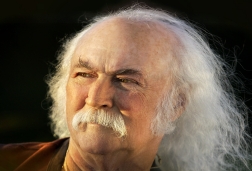
David Crosby has been an important part of the musical and (counter-)cultural landscape for over 50 years.
He was a founding member of The Byrds, and contributed to hits including “Mr. Tambourine Man”, “Turn! Turn! Turn!”, and “Eight Miles High”, which he co-wrote. He then co-founded Crosby, Stills & Nash (and sometimes Young), writing or co-writing “Guinnevere”, “Almost Cut My Hair”, “Long Time Gone”, and “Wooden Ships”, and contributing vocals on such beloved songs as “Suite: Judy Blue Eyes”, “Teach Your Children”, “Our House”, and “Woodstock”.
While he is best known for his work as a member of a group, Crosby also released the acclaimed 1971 solo album If I Could Only Remember My Name, and several other solo albums, most recently 2014’s well-received Croz. And two more solo albums are currently in the works.
This interview was for a preview article for noozhawk.com for Crosby’s solo concert on 3/22/16 at the Granada Theatre in Santa Barbara. It was done by phone on 3/11/16. (Django Crosby photo)
Jeff Moehlis: What can people look forward to at the upcoming concert at the Granada Theatre?
David Crosby: Solo acoustic is good for taking people on a little voyage. The words count – that’s really the biggest advantage. The words really get through, because there’s no lead guitars, there’s no drums, there’s nothing to get in the way. That part I really love. I love being in a band, too, but I really like making the songs speak out, and being able to communicate with people.
Then there’s the fact that I get to sing a whole lot more songs than I do in a band setting, and I get to sing more obscure ones. I really love it. I get to talk to the audience, I get to communicate with them. I get to take take them on a trip. I have a whole long history to work with, from The Byrds on up – Crosby, Stills & Nash, Crosby, Stills, Nash & Young, CPR, Crosby Nash, solo stuff. I’ve got a whole lot of material to work with.
JM: You have a strong Santa Barbara connections.
DC: [laughs] Oh yeah.
JM: Could you tell us a bit about your Santa Barbara memories, from when you were younger?
DC: I moved here in about 5th grade, and I lived first in Carpinteria, I think. I went to school at Crane School in Montecito, and then I went to Cate School down in Carpinteria, then I went to Santa Barbara High. I graduated from Santa Barbara High, and I did one year at Santa Barbara City College, which was a joy. So I lived there for a really long time, and pretty much grew up there. And I love it there. Now I live up in Santa Ynez, right over the hill.
JM: Someone wanted me to ask you about what you were like as a student at Crane.
DC: I loved it there, and it’s a great school. I enjoyed the hell out of it. And I sent my daughter there, actually – Donovan went there. I like it, it’s a great place. My memories of Crane are excellent.
JM: I understand that you have two new solo albums that are in the works. Can you tell us a little bit about those?
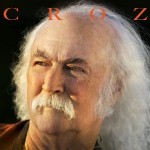
DC: I’ve been very lucky lately in terms of songs – a lot of songs, otherwise I wouldn’t be doing two albums. But the songs have been coming. One is with my son, James Raymond producing, like the Croz record that I put out last year. That was really good. It did well and I had a blast doing it. Then the second one is one that I’ve already finished, that’s with Michael League producing. Michael is the composer and bandleader for a band called Snarky Puppy, a fantastic musician. So between the two of them I’ve got two records. The first one, the Michael League one, it’s finished and mastered, and should be out within a couple months. The second one, we’re two-thirds of the way through. It’s more of a band record. The one with Michael is more of an acoustic guitar and vocal record.
JM: Just to be clear, I read that one of the albums will be called Lighthouse. Is that the one that will come out first?
DC: Yeah, that’s the one that Michael League produced, and that’s the one that will come out first.
JM: Speaking of your solo work, you might find it hard to believe but your first solo album is now 45 years old. What are your reflections on that particular album?
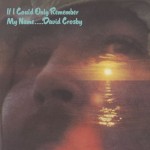
DC: You know, it was a joy, that record. It was a very tough time in my life, and that record kept me alive. My girlfriend [Christine Hinton] had been killed in a car wreck, and I was pretty depressed. I had just finished Deja Vu with the four of us, and I was having a hard time, and I didn’t know where to go or what to do, other than stay in the studio, which was the only place where I knew what I was doing. It kept me alive. It gave me something to do. I knew what I was doing, and that made it good for me. And the record came out pretty great.
JM: How is your approach to songwriting different now from back then, say when you were doing your first solo album or the early albums with CSN?
DC: I think mostly just that I pay more attention to it, I take it more seriously. Back then I would just accept the fact that a song would come, and would be really grateful for it and enjoy working on it, but now I make a real effort to work everyday on trying to get it to work.
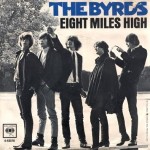
JM: I’m sure you don’t keep track of these sorts of things, but “Eight Miles High” came out exactly 50 years ago from next Monday [it was released 3/14/66].
DC: [laughs]
JM: That’s a big anniversary, obviously. In honor of that anniversary, can you tell us a bit, from your perspective, how that song came together?
DC: Roger McGuinn and Gene Clark and I were on tour, and Gene started the song and brought it to Roger and I, and we wrote it together, the three of us. [laughs] It kind of caused a lot of trouble, that song, because they said it was a drug song, so they took it off the air just as it was becoming a hit. We had a great time with the entire process.
We recorded it twice. I don’t think hardly anybody’s ever heard the first one, where we snuck out and did it on the outside [at RCA Studios]. The one that everybody heard was the one we did in Columbia [Studios], where we had to do it because of our contract.
JM: What were your specific contributions? Did you contribute to lyrics or was it more on the music side?
DC: Both. We all pretty much contributed to both.
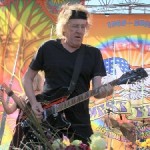
JM: I want to ask you about one of your old friends who passed away recently, Paul Kantner. What did you learn from him about life and music?
DC: You know, he was a really good friend, a seriously adventuresome cat musically and lyrically. I don’t know what I learned, but we were buddies and roommates. He and I and David Freiberg, who started Quicksilver [Messenger Service], were all living together in Venice before we went off and started The Byrds and Jefferson Airplane and Quicksilver. He was a friend for a long time. I liked him. He was a pretty strong guy. I liked him a lot.
JM: To me it’s kind of mindblowing that the three of you were roommates back then. Do you have any stories you’d be willing to share from that time?
DC: It was a pretty ordinary thing. We lived down in Venice Beach in L.A., and had a cheap apartment. We all wanted to be musicians, so we kept playing and singing and learning songs and stuff, and then it happened for us, all of us.
JM: Like Paul, you’re one of the few artists that performed at three of the watershed concerts of the 60’s – the Monterey Pop Festival, Woodstock, Altamont. Why do you think those events are still holding so much fascination for us all almost 50 years later?
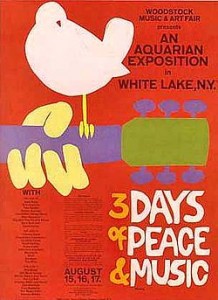
DC: Well, they were big and adventuresome concerts. You know, they get larger with age. Things kind of aggrandize themselves as you move away from them in time – they get larger. They assume legendary proportions.
At least Woodstock was a lot of fun. Some of the others were not, at all.
JM: Well, I can understand that about Altamont.
DC: Yeah, that’s what I’m thinking of [laughs].
JM: I would say that a lot of people don’t even realize that you guys [Crosby, Stills, Nash & Young] played at Altamont. Are you willing to share any memories of that event?
DC: It was a mess. The biggest mistake was made by the guys who were The Grateful Dead’s management back then. They thought it’d be cool, because they knew a lot of Hell’s Angels – and we were all friends with the Hell’s Angels back then – to hire the Hell’s Angels as security. That was a huge mistake.
And afterwards, a really interesting thing happened. The press and everybody was getting down on the Hell’s Angels, saying “They’re so terrible”, “They killed this guy and it was an awful, terrible, brutal thing.” And they interviewed me for it, and I said, “You know, if you don’t want the tiger to eat your lunch guests, don’t invite the tiger to lunch.” I said, “The Hell’s Angels fight. That’s a large part of who they are and what they do. So they do fight, and they like fighting, and that makes them a very bad choice for security for a concert.” Especially a completely uncontrolled crazy concert like that.
But the mistake was in the people who asked them to do a job they were entirely not suited for. And I stuck up for them. I said, “They’re like inviting a tiger over. If it eats your lunch guests, then it’s your fault.” [laughs] As a result, they put my picture up in the home chapter of the Hell’s Angels in Oakland for a long time. I don’t think it’s still there, but it was for a long time. I was the only one that stuck up for them.
JM: Was Monterey Pop enjoyable?
DC: Monterey Pop was fantastic! We had a blast.
JM: And you played with two bands there, right?
DC: Yes I did. I played with The Byrds and Buffalo Springfield, both.
JM: And Woodstock was a great experience?
DC: Yeah, I think it was. I have trouble remembering everything. I can’t imagine why.
JM: [laughs] Well I think it was Paul Kantner that said if you remember the 60’s, then you weren’t there, right?
DC: Yeah, I think he’s one of the ones that did.
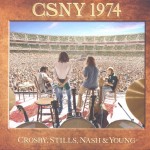
JM: I’ve been enjoying the new box set that came out recently for the Crosby, Stills, Nash & Young 1974 tour. I know that in the past you called that the “Doom Tour”. Have your feelings changed on that tour when you reflect on it now forty-something years afterwards?
DC: Well… Playing the music was fun, but some of the managers and people swiped a whole bunch of the money, so there were things about it that were not fun. But playing the music was fun.
JM: Returning to the upcoming concert, I notice that you’ve been posting an email address [askcroz@gmail.com] where people at the concert can send you questions. Is that something you’ll do here in Santa Barbara also?
DC: Yeah. There’s no guarantee I’ll answer them at the show you’re at, but there’s a chance I might. I do get some pretty interesting ones, I’ll say that.
JM: So here’s a follow-up. What are some of the weirder questions that people have asked?
DC: There’s one guy that sent me probably twenty messages on there, and no question. [laughs] He just ranted on and on and on and on and on and on and on. But he never did manage to get to a question.
Some of them are just simple and funny. “How did you get that beautiful moustache?” Well, it just appeared on my lip [laughs]. You wake up and it’s there. Some of them are people that are actually asking you something serious, and then I try to answer them.
JM: Is there anything that you want to set the record straight on? Say, that people always get the story wrong about?
DC: No, no, no. I’m fine with how it is.
JM: Where are you speaking to me from?
DC: I’m in Portland, Oregon.

Discussion
No comments for “Interview: David Crosby”